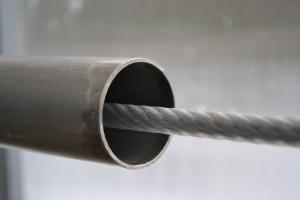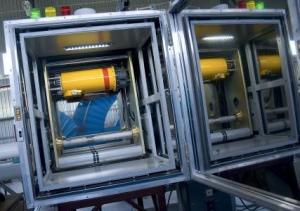Successful jacketing in Protvino
8 Mar 2012
-
Alexander Petrov, ITER Project Center Russia
Manufacturing the toroidal field conductors for the ITER magnet system is a sophisticated, multistage process that was pioneered in Russia in summer of 1997.
Earlier this year, the specialists at JSC VNIIKP Podolsk cables a 760-metre cable made from 900 niobium-tin strands and 522 copper strands assembled in five stages around a central cooling spiral—the second product of this kind manufactured in Russia.
Late February, at the brand-new jacketing line at the High Energy Physics Institute in Protvino, this cable was pulled through a stainless steel jacket assembly.
The successful cable pull-through process, which required the most advanced Russian technical know-how, was accomplished with representatives of the Russian Domestic Agency and the ITER Organization present. The jacket itself, reaching nearly one kilometre in length, is composed of more than 70 austenitic steel tubes, butt-welded by gas tungsten-arc welding technology. Each orbital weld was subjected to stringent quality control tests, including X-ray, local helium leak tests, and dye penetrant.
Each orbital weld is subjected to stringent quality control tests, including X-ray, local helium leak test and dye penetrant. This photo shows the X-ray camera used for the quality checks.¶
This insertion stage was followed by the compaction and spooling of the conductor (cable plus jacket) on a four-metre-diameter solenoid—a process that will take approximately two weeks. The product will then be transported to the Kurchatov Institute where it will undergo vacuum and hydraulic tests and await shipment to Italy, where the conductor will be wound.
We wish to thank Arnaud Devred, Superconductor Section Leader, for his contribution to this article.
We wish to thank Arnaud Devred, Superconductor Section Leader, for his contribution to this article.




